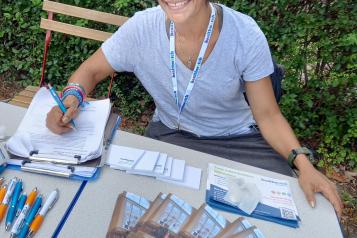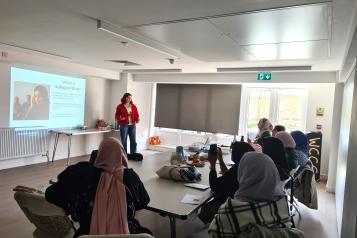Beyond the GP: Has ARRS improved access to care in Greenwich?

Gone are the days when GPs geared up for a day of treating coughs, colds, and conducting simple health checks. Today, the caseload is far more complex.
There’s been a gradual shift of a lot of hospital activity coming into general practice. It is quite complex because patients have got more than one problem, so you’re managing quite a few things at one time. You sort of move from a general practice generalist to almost being a hospital general physician.
The Promise of ARRS in Greenwich
The ARRS scheme was designed to relieve some of this pressure by allowing PCNs to hire a broad range of professionals—mental health workers, physiotherapists, podiatrists, and more—who can be directly accessed by patients without a GP referral. This multidisciplinary team (MDT) approach allows GPs to focus on complex cases while freeing up appointments for those with more straightforward issues to see other healthcare professionals.
In Greenwich, this shift is well established.
We’ve got the mental health workers that are provided by Oxleas, and they can see patients directly. They are also giving ample time; they offer half an hour appointments, so they discuss quite a lot with the patient. First contact physiotherapist, they’re a godsend as well. They are directly bookable by patients for back pain, joint problems, sprains, and aches.
These extra roles have been transformative, allowing GPs to “start looking at general practice from a population perspective " and to adopt a “multidisciplinary approach to looking after complex needs” shares Dr Patel.
The Changing Face of General Practice
Traditionally, general practice focused on individual patient care, and practice population health—treating each person based on their specific health needs, whilst looking to improve public health measures for the practice population as a whole. The switch to a ‘PCN population perspective’ moves beyond an individual focus to consider a broader patient population, prioritising preventative care and interventions that improve health outcomes across communities. Ultimately, this approach aims to reduce the pressure on general practice by preventing illness and promoting early intervention.
With additional staff taking up some of this more routine or straightforward workload, general practitioners are now able to spend the time they need with patients with more complex conditions.
A lot of practices are now moving to 15-minute consultations instead of the 10-minute consultation...complexity has grown in general practice, so a 10-minute consultation doesn’t cut it for people who present with three or four problems... So, we’re giving them longer appointments.
Similarly, Dr Tran, Chair of the Greenwich Local Medical Committee, shares, “For our large practice, workload in terms of hospital letters, discharges, created a risk of burnout for our doctors. So, actually having a pharmacy technician who can help do some of that medicine's reconciliation was a huge benefit and was really well received by clinicians.”
More time with the patients who need it most is a great outcome. But beneath that lies a growing concern about the sustainability of the model.
With ARRS staff taking away kind of more straightforward, simple problems, the GP is left with patients with depression, diabetes, heart failure, which is quite a lot. And if you happen to see those patients repeatedly in one clinic, it can be quite draining. This needs to be considered and managed to prevent burn-out in the GP workforce.
The Patient Perspective
While this shift to a new way of working has benefits, it’s not widely understood by patients and some feel left behind. National Voices, a patient advocacy group, found that many people view this as a cost-saving measure, not a pathway to better care. A sentiment echoed particularly by those who already face systemic barriers—language being a critical one. In Greenwich, our research shows that the lack of translation services in local GP practices is a significant barrier. Without translators or advocates, patients run the risk of misunderstandings and noncompliance with treatments- especially troubling in a population with significant health inequalities.
“There is a significant issue affecting the Nepalese community in our area. When we call the GP to book an appointment, there is no translator available for the Nepalese language, both in the mornings and evenings. This problem is experienced by many Nepalese residents in the Plumstead area, and it is a challenge for those who do not understand English”. Shares Devi, a carer for her 75-year-old mother and a long-standing volunteer for the Nepalese community.
People with complex needs, particularly those relying on translators, find it harder to communicate their needs across multiple professionals, adding another layer of complexity that isn’t being addressed.
With the ARRS entering its sixth year, the challenges for GPs have not reduced but changed. More staff may reduce pressure in some areas, but in others, it amplifies the strain with GP patient caseloads becoming ever more complex.
For patients, greater dialogue is needed both to communicate these new ways of working and begin a debate on what patients can expect from general practice, and what practitioners can safely and reliably offer them.
As Greenwich residents continue to navigate these changes, one thing is clear: timely, quality care remains the goal. However, the real challenge lies in balancing this with growing demand on an already overstretched system.
Dr Tuan Tran is a general practitioner with over 18 years of experience practicing in Greenwich. In 2016, he became a GP Partner at Ferryview Medical Practice and currently serves as the chair of the Greenwich Local Medical Committee.
Dr Nayan Patal qualified as a doctor from University College London in 1993 and has been practicing as a GP at Blackheath Standard Surgery in Greenwich since 1997. He further works alongside Dr Tran as vice-chair of the Greenwich Local Medical Committee.


